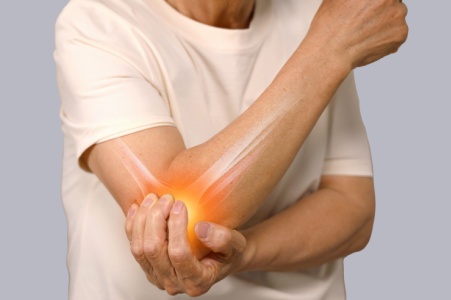Blog

Elbow pain affects daily activities like lifting, gripping, and reaching. It can develop from overuse, repetitive motions, or sudden trauma. Common causes include bursitis, which is inflammation of the fluid-filled sac that cushions the joint, as well as injuries to ligaments and tendons that provide stability and movement. Sprains and strains may also occur from sports, work-related tasks, or falls, leading to swelling, stiffness, weakness, and pain with motion. Symptoms may range from mild discomfort to sharp pain that limits arm function. A chiropractor can help by assessing joint alignment, improving mobility in the elbow and surrounding joints, and reducing inflammation. If elbow pain is interfering with work or daily life, it is suggested that you consult a chiropractor to begin a personalized plan focused on natural healing, strength, and long-term relief.
Elbow pain can make even simple tasks challenging, often resulting from repetitive movements, strain, or injuries. Conditions like tennis elbow, golfer’s elbow, and nerve entrapment are common culprits, leading to inflammation and discomfort in the tendons or surrounding tissues. Whether caused by sports, work activities, or an accident, persistent elbow pain can hinder mobility and strength.
Symptoms may range from sharp pain and stiffness to numbness or a weakened grip, interfering with daily life. While pain relief methods like rest can help, they may not address the underlying problem.
Chiropractic care focuses on identifying and treating the source of elbow pain. Through gentle adjustments, soft tissue therapies, and targeted exercises, chiropractors relieve tension, improve joint function, and reduce inflammation. This holistic approach helps not only to ease pain but also to prevent future issues, ensuring long-term comfort and mobility.
1. How does spinal alignment affect elbow pain?
Misalignments in the spine can compress nerves that travel to the arm, leading to referred pain or tension in the elbow. Correcting alignment helps relieve this pressure and improve function.
2. How can chiropractic care help prevent recurring elbow injuries?
Chiropractors identify movement patterns or misalignments that contribute to strain and provide strategies to improve mechanics. This reduces the likelihood of reinjury.
If you have any questions please feel free to contact our office located in Largo, FL .

Jaw pain and trouble with chewing can come from problems in the temporomandibular joint, or TMJ. This joint connects the lower jaw to the skull, allowing the jaw to move up, down, and side-to-side. Overuse from chewing, habits like teeth clenching or grinding, past injury to the jaw, or stress can strain the muscles, ligaments, and soft tissues surrounding the joint. Many people with TMJ issues feel pain in the jaw, around the ears, or in the face. Some notice popping or clicking when they open or close their mouth, locking or difficulty moving the jaw, in addition to soreness while chewing, headaches, or even neck stiffness. A chiropractor can help by gently guiding the jaw, neck, and spine into healthier motion patterns, which may ease tension in muscles and reduce pressure on the joint. This type of care may support better jaw movement and greater comfort during eating and everyday activity. If jaw pain or difficulty chewing is affecting daily life, it is suggested that you contact a chiropractor to learn how in‑office care may support relief and improve jaw function.
TMJ: Temporomandibular Join Disorders
Temporomandibular Joint, or TMJ disorders, affect the hinge connecting the jaw to the skull, leading to pain and difficulty with jaw movement. Common causes include teeth grinding, jaw clenching, injury, or arthritis. Symptoms often include jaw pain, clicking or popping sounds when opening the mouth, headaches, and difficulty chewing. If left untreated, TMJ disorders can significantly impact daily activities, including eating and speaking.
Managing TMJ disorders typically involves lifestyle adjustments, such as stress reduction to minimize clenching and grinding, along with gentle jaw exercises to improve mobility. In some cases, wearing a night guard may help protect the joint from further strain.
Chiropractic care offers a unique approach to TMJ relief by focusing on the alignment of the jaw and neck. Chiropractors use gentle adjustments to reduce tension in the surrounding muscles and improve joint function. Techniques like myofascial release may be applied to alleviate tightness in the face and jaw area. By addressing related spinal or muscular imbalances, chiropractic care helps reduce pain and promote overall jaw health.
1. Can TMJ problems cause dizziness or vertigo?
Yes, TMJ dysfunction can affect the inner ear through muscle tension or nerve involvement, leading to balance issues or dizziness. Chiropractic adjustments to the neck and jaw can address alignment issues that contribute to dizziness.
2. Can chewing on one side worsen TMJ disorders?
Yes, consistently chewing on one side can overwork one side of the jaw, leading to imbalances and further TMJ issues. A chiropractor can restore balance to the jaw and surrounding muscles, reducing the impact of uneven chewing.
For additional information, please contact our office located in Largo, FL .

Mid-back pain, also known as thoracic back pain, occurs in the area between the base of the neck and the bottom of the rib cage. This type of discomfort can result from bad posture, which places stress on the spine, or from an overstretched or torn ligament caused by sudden movement or overuse. These issues can lead to stiffness, aching, and limited mobility during daily tasks. A chiropractor can help by evaluating spinal alignment, identifying areas of tension, and providing gentle adjustments that restore proper motion. Soft tissue therapy and posture guidance can further support healing and prevent future flare-ups. If mid-back pain is affecting your comfort or activity, it is suggested that you schedule a visit with a chiropractor to learn how personalized care can improve your mobility and overall well-being through natural relief and treatment solutions.
Mid back pain, centered in the thoracic region, refers to discomfort or stiffness in the upper and middle back, which connects to the ribcage. This area is essential for stability and movement, but poor posture, repetitive strain, or injuries can cause irritation and tension. Pain may range from a dull ache to sharp, localized discomfort that worsens with certain movements or prolonged sitting.
Chiropractors take a thorough approach to managing mid back pain, identifying misalignments or tension in the thoracic spine that may contribute to discomfort. Spinal adjustments, tailored to improve alignment and relieve pressure, form the core of treatment. Supporting therapies like guided exercises, posture correction techniques, and ergonomic recommendations are also employed to enhance recovery and prevent future issues. Chiropractic care helps restore balance and function, allowing patients to move freely and live without pain.
1. Can carrying a heavy bag or backpack cause mid back pain?
Yes, uneven weight distribution from a heavy bag can strain the thoracic spine and surrounding muscles, leading to pain. Chiropractors can help correct alignment and recommend strategies to reduce strain.
2. How can chiropractic care help desk workers with mid back pain?
Chiropractors address postural imbalances and spinal restrictions caused by prolonged sitting, using adjustments and ergonomic advice to relieve pain and prevent recurrence.
For additional information, please contact our office located in Largo, FL .

Chronic headaches can interfere with work, rest, and daily activities, often stemming from tension in the neck, poor posture, or pressure on nerves in the upper spine. Common causes include long hours at a desk, stress, muscle tightness, or previous neck injuries. Symptoms may involve dull or throbbing pain, stiffness in the neck and shoulders, and sensitivity to light or sound. A chiropractor can help by addressing misalignments in the spine that may be placing pressure on nerves or restricting movement. This approach focuses on improving how the joints and muscles of the neck and back function, which can reduce tension and help restore balance in the body. If headaches are becoming a regular part of your life, it is suggested to schedule a visit with a chiropractor to find the source of the problem and start feeling better naturally.
Chronic Headaches
Chronic headaches can disrupt daily life, but chiropractic care offers an effective, holistic approach to managing and relieving headache symptoms. Chiropractors assess spinal alignment, posture, and muscle tension, which often play a role in chronic headaches. By addressing these factors, chiropractic care aims to reduce headache frequency and intensity.
A Chiropractor’s Approach
A chiropractor’s approach typically includes spinal adjustments, which help alleviate tension in the neck and upper back that may contribute to headaches. Chiropractic care may also incorporate lifestyle advice, including guidance on ergonomics, stress management, and targeted exercises tailored to reduce headache triggers. Regular adjustments provide a preventive approach, supporting overall spinal health and minimizing factors that can cause or worsen headaches.
Why Is Regular Chiropractic Care Important for Headache Relief?
Ongoing chiropractic care can relieve tension and prevent misalignments, both of which are common headache triggers, allowing patients to achieve long-term relief.
When Should You Consider Chiropractic Care?
Patients with frequent headaches should consider regular chiropractic visits, often recommended every few months or as advised, to support effective headache management.
If you have any questions, please feel free to contact our office located in Largo, FL .
